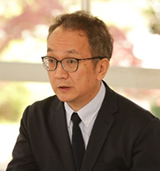Message
Dr. Keiji MATSUDA, Vice-President in charge
 This project is intended to investigate and research what qualities and abilities should be fostered at school education sites in order to cultivate human resources able to take the lead in Japan and the world in the next generation. To realize that goal, we strive to develop educational models capable of responding to the next generation and suggest practices based on the models.
This project is intended to investigate and research what qualities and abilities should be fostered at school education sites in order to cultivate human resources able to take the lead in Japan and the world in the next generation. To realize that goal, we strive to develop educational models capable of responding to the next generation and suggest practices based on the models.
For development, we set a goal of systematizing and modeling class practice and class study in Japan and of disseminating them internationally through the OECD. Particularly, the fostering of cross-subject skills and character will be systematized from a perspective of active learning. In addition, with an eye toward the new Course of Study that will be newly revised, we reconstruct and reorganize educational goals, contents, and methods transcending subjects from the perspective of qualities and abilities that should be fostered in the future and aim at constructing new class systems and educational and class models.
Tokyo Gakugei University has set ‘Dissemination of Next-Generation Educational Models and Base Creation’ as the strategy for the third mid-term goal and plan. Promotion of the project is regarded as the very core of our university. Therefore, faculties, graduate schools, and affiliated schools must make an all-out effort to achieve the strategic goals. Achievements of the project will lead to powerful suggestions to teacher training education, particularly to the resolution of contemporary educational issues. Combined with the development of new teacher education curriculum, they are expected to improve educational, research, and social contribution activities of the university.
We would like to ask you to continue to devote close attention to the achievements of the project and to lend your guidance and criticism.
Dr. Kazumi YAMADA, Chief Researcher
Today, the words ‘next generation’ are used ubiquitously. Considering the next-generation as ‘the world in 2030’ when the five-year old children in front of us will be 20 years old, it does not seem so distant from now. Rather, the reality of present-day school education becomes starkly apparent. On the other hand, numerous prospective reports the year of 2030 released by think tanks point out that if a megatrend, that is to say, a major trend that directs the future world and which cannot be ignored, continues, the social environment in the world will change to a considerable degree. Similarly, the OECD predicts that the world will be more volatile, uncertain, complex, and ambiguous in the future because of problems such as migration and environment, civil rights, family, peace and safety, technology, health, occupation, and inequality.
Then, assuming the degree to which the world in 2030 can be expected to be transformed, what qualities and abilities should children of the future acquire and cultivate through school education? In relation to that issue, a workshop of OECD’s project ‘EDUCATION 2030’ was held in Paris on November 16. There, as a framework of new qualities and abilities, the following concepts were proposed: (1) cognitive competency, (2) social competency/ skills, (3) emotional competency, (4) physical competency/ health, and (5) comprehensive meta-competency.
Responding to the trend, this project clarifies the relation between ‘current education in Japan’ and ‘education required in the world in 2030’ in cooperation with the OECD, taking advantage of the functions as a do tank, which is the strength of our university. In practice, Departments 1, 2, and 3 in the project mutually cooperate to record and analyze classes of mainly affiliated schools with a framework for all subjects in addition to Japanese language, social studies, and arithmetic. It is expected that the achievements leading to the future ways of education, teacher education, and training will be accumulated and introduced at home and abroad in the future.